Understanding the Center
In science, the term "center" refers to the middle point of an object or a system. The center is often used to describe the location from which other parts of the object or system are measured or from which they radiate.
Examples of Center in Science
- The center of a circle is the point equidistant from all points on the circumference.
- The center of mass is the point at which the entire mass of an object is considered to be concentrated.
- The Earth's core is considered the center of the Earth, and it is where the planet's magnetic field is generated.
Studying the Center
When studying the concept of the center in science, it's important to understand how it relates to different scientific disciplines and phenomena. Here are some key points to consider:
- Geometry: In geometry, the center is a crucial concept when studying shapes and figures. Understanding the center of a circle, for example, helps in calculating its circumference and area.
- Mechanics: In mechanics, the center of mass is a vital concept for understanding the motion and stability of objects. It helps in predicting how an object will behave when subjected to forces.
- Earth Science: The Earth's center plays a significant role in understanding its structure, composition, and magnetic field. It also influences phenomena such as earthquakes and volcanic activity.
Study Guide Questions
- What is the significance of the center of a circle in geometry?
- How is the concept of the center of mass applied in the field of mechanics?
- What role does the Earth's center play in Earth science and geology?
By understanding the concept of the center in science, we can gain insights into the organization, behavior, and structure of the natural world around us.
[Center] Related Worksheets and Study Guides:
.◂Science Worksheets and Study Guides First Grade. Living and nonliving things
Study Guide Living and nonliving things
Living and nonliving things  Activity Lesson
Activity Lesson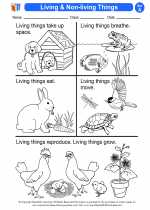 Living & Non-living Things
Living & Non-living Things  Worksheet/Answer key
Worksheet/Answer key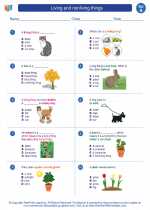 Living and nonliving things
Living and nonliving things  Worksheet/Answer key
Worksheet/Answer key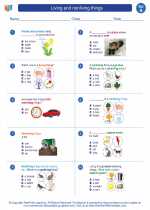 Living and nonliving things
Living and nonliving things  Worksheet/Answer key
Worksheet/Answer key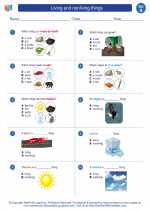 Living and nonliving things
Living and nonliving things  Worksheet/Answer key
Worksheet/Answer key Living and nonliving things
Living and nonliving things  Vocabulary/Answer key
Vocabulary/Answer key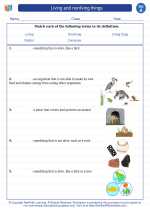 Living and nonliving things
Living and nonliving things 

 Activity Lesson
Activity Lesson
 Worksheet/Answer key
Worksheet/Answer key
 Worksheet/Answer key
Worksheet/Answer key
 Worksheet/Answer key
Worksheet/Answer key
 Worksheet/Answer key
Worksheet/Answer key
 Vocabulary/Answer key
Vocabulary/Answer key

The resources above cover the following skills:
Concepts of Life Science (SC1, SC2, SC3)
The student demonstrates an understanding that all organisms are linked to each other and their physical environments through the transfer and transformation of matter and energy by identifying and sorting examples of living and non-living things in the local environment. (L)